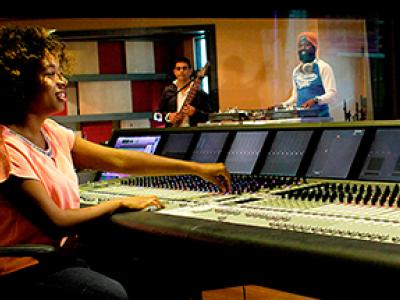The learning outcomes for this major fall under four main themes: professional discourse and analysis, tools and technology, methodologies and best practices, and business practices and career strategies.
Professional Discourse and Analysis:
Upon successful completion of this major, students will:
- develop the critical listening skills necessary to participate in the community discourse of professional record makers;
- demonstrate professional-level best practices in production and critical assessment; and
- perform advanced analysis of both aesthetic form and commercial function in records across a variety of musical genres.
Tools and Technology:
Upon successful completion of this major, students will:
- demonstrate high-level application of recording, mixing, mastering, and musical-instrument software tools;
- prepare a personal studio environment for recording, monitoring, mixing, and mastering; and
- refine a theoretical knowledge encompassing core principles of DAWs for competence, which may then be applied to new situations and tools not yet encountered.
Methodologies and Best Practices:
Upon successful completion of this major, students will:
- demonstrate skill in recording acoustic and digital sound sources;
- identify and use best practices in editing, mixing, and mastering; file and metadata management; storage and retrieval of media assets; and quality control; and
- produce and deliver commercially competitive masters to record labels, streaming services, and other media outlets in a variety of recommended formats.
Business Practices and Career Strategies:
Upon successful completion of this major, students will:
- demonstrate acumen in managing their careers as independent record-makers;
- acquire conceptual knowledge of how to integrate their talents with the professional community;
- develop an independent artist recording budget for their and their client’s time, money, and technical resources; and
- learn how to appropriately set and change rates for their services throughout their career.





